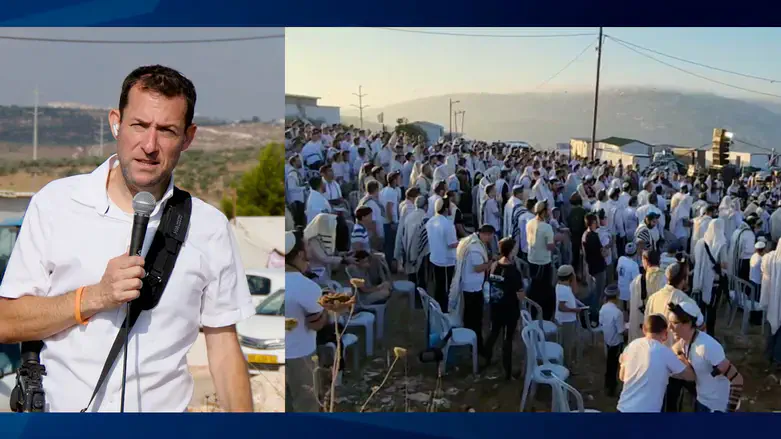
Head of Samaria regional council, Yossi Dagan, spoke to Israel National News - Arutz Sheva from the new community of Evyatar, three years after its official establishment.
“It is very exciting, it gives us a lot of strength,” Dagan shared his feelings. “We overcame many challenges, and I kept on telling myself that the greater the challenges, so our goals are more historic. The fact that we have succeeded, that the Cabinet has recognized Evyatar as full-fledged village/town in Israel, has practical implications on the future of the state and Jewish communities.
Dagan recalled the first days of Evyatar, “We came here three years ago after Yehuda Guetta was murdered. We came again after Evyatar Borovski was murdered. Then 53 families came, with many members of Knesset and I even moved my office to here.”
Due to bureaucratic changes, the families had to leave for a while, but the buildings remained. About one year ago, after the murder of four Jews at the Eli gas station, we came back, we set up a Yeshiva here, and we have finally been recognized at the 37th community in the Samaria regional council.”
Dagan says he does not believe that this is “on paper only. Evyatar is here to stay. We have families, we have large Yeshiva, we have a government decision that recognizes the village, and we are applying for regulated construction here. Evyatar has broken down political and racial walls against Jews building homes in Israel, and especially in Judea and Samaria. But there will be many more like it.”
Dagan continues to say that “Evyatar is a symbol. It is a fact on the ground. All we have to talk about now is how many people will live here.” He wholeheartedly believes that the government decision to recognize Evyatar gives tailwind to the IDF to win this war. These decisions also give the government the strength to bring back the hostages following a victory, because in the end, when we connect to our roots and our home, we gain power.”
Regarding the security situation in Judea and Samaria, Dagan emphasizes that, “it is obvious that this war is a strategic and direct outcome of the Oslo Accords and the Disengagement of communities in Gaza and northern Samaria. What is happening in the north is a direct result of our withdrawal from Lebanon. It’s our defeatist attitude of running away.”
“On the other hand,” concludes Dagan, “we have proven that we can do it another way. When we connect to our land, to our roots, to Zionism; when we have national self-pride, we also enjoy military strength and victory. Evyatar is not another village and not another hiking site; Evyatar is our message to the world, and to ourselves, that the Land of Israel belongs to us. We are building it, and we are here to stay. Am Yisrael Chai.”
